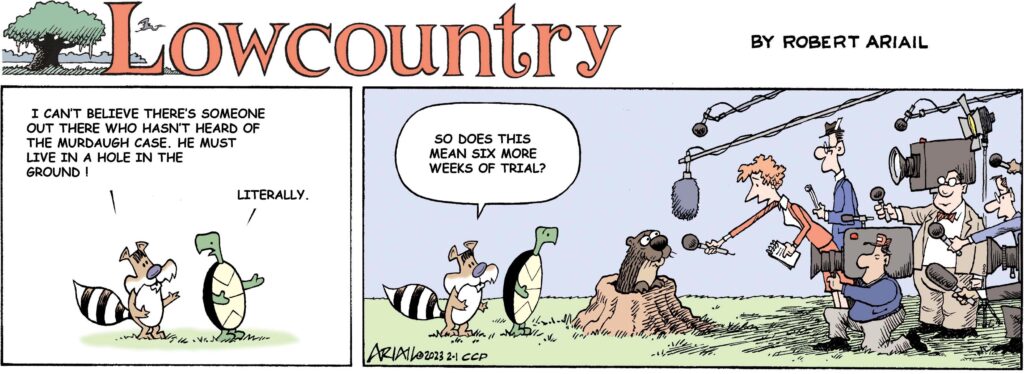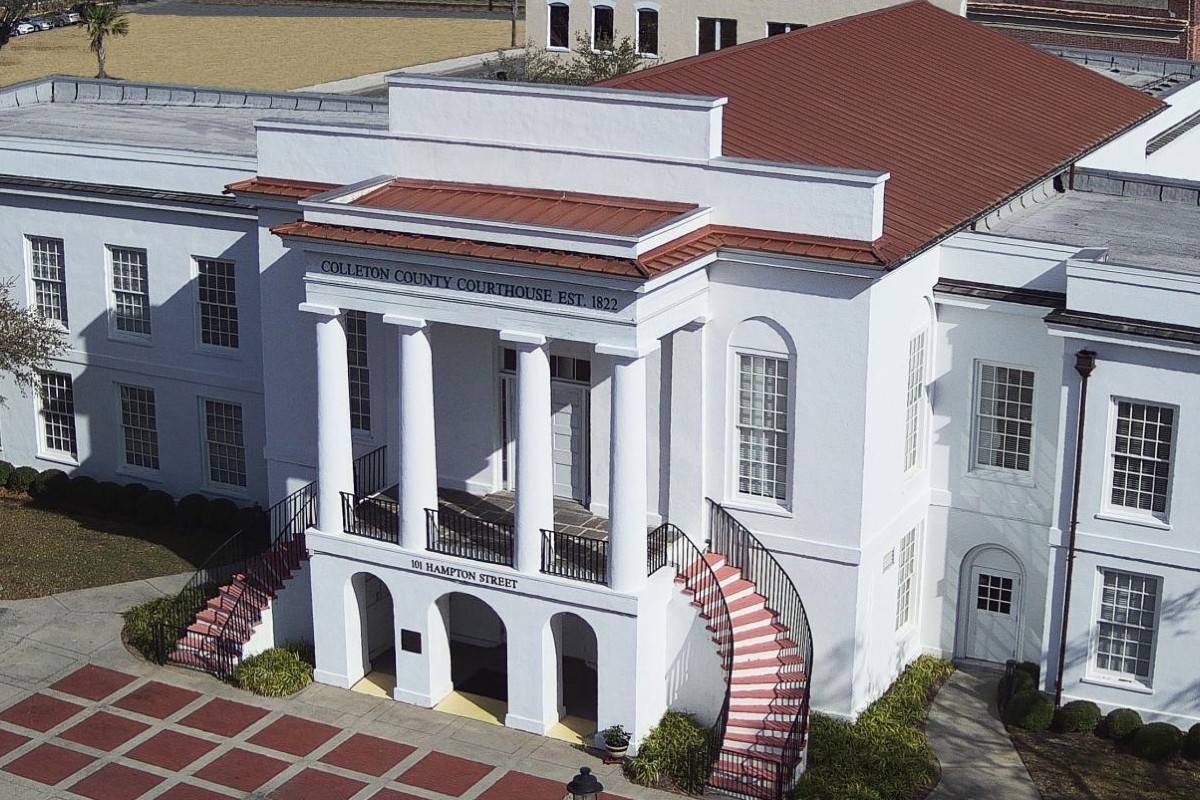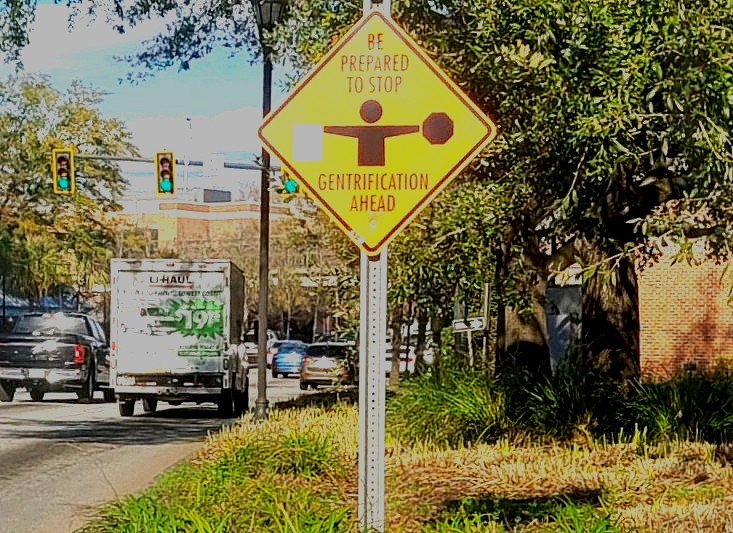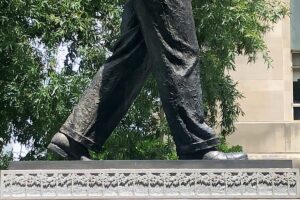STATEHOUSE REPORT | ISSUE 22.05 | FEB. 3, 2023
NEWS: Padgett steps down from SCETV’s top post
NEWS BRIEFS: S.C. Senate supports school voucher program
LOWCOUNTRY, Ariail: Groundhog Day
COMMENTARY, Brack: Tweak way of picking judges in South Carolina
SPOTLIGHT: Riley Institute at Furman University
MY TURN, Woodrum: Murdaugh trial doesn’t represent S.C.’s legal system
FEEDBACK: Send us your thoughts
MYSTERY PHOTO: Odd sign
Padgett steps down from SCETV’s top post

Staff reports | Anthony Padgett, the president and CEO of SCETV, resigned Thursday, effective March 3.
In a 1:26 p.m. Thursday electronic message to staff, Padgett didn’t give a reason for his departure or what he planned to do. Just over an hour later, a press release said Padgett would become the Thomas Rieland Endowed General Manager of WOSU Public Media in Columbus, Ohio, starting March 6. The public media group is affiliated with The Ohio State University.

In the email, Padgett said:
“Over the past six years, I have had the pleasure of leading this group of forward-thinking, creative and passionate individuals. We have accomplished a tremendous number of industry-leading feats with the expansion of our digital programs and podcasts, new educational initiatives and the diversification of our agency resources. I look forward to seeing the great things that will come from the team in the months to come.”
SCETV Commission Chairman Richard Cohn praised Padgett’s tenure at the network.
“Under Anthony’s leadership, SCETV has enhanced its platforms and continued to provide educational resources to the State of South Carolina,” he said. “We (the SCETV Commission) are looking forward to this next chapter in our history and expect to see many more great things from our exceptional staff.”
But Padgett’s career at the statewide public radio and television network has had some hurdles.
In September 2021, the network backed off an exploratory leadership proposal to lease space in its Columbia studio to a private broadcaster following pushback by staff.
That proposal to generate new revenue came two years after a former board chairman and two others resigned after months of drama to try to get more money from SCETV’s nonprofit endowment that has pumped millions of dollars into the network to ensure South Carolinians get high-quality public programming.
In his announcement Padgett told staff more details on a transition plan would emerge over the next week. In the meantime, the network’s executive team would remain in place to lead SCETV.
- Have a comment? Send to: feedback@statehousereport.com
S.C. Senate supports school voucher program
Staff reports | South Carolina senators on Wednesday approved a scholarship accounts program that expands private school tuition vouchers, making them available to a wider population.
![]() On Wednesday, senators made what the Associated Press called “consequential changes” to the voucher proposal by expanding it beyond those who qualify for Medicaid to allow middle-class families to apply. The program, if approved next by the House, would allow public tax money to pay for costs of K-12 education, a Republican priority for about two decades.
On Wednesday, senators made what the Associated Press called “consequential changes” to the voucher proposal by expanding it beyond those who qualify for Medicaid to allow middle-class families to apply. The program, if approved next by the House, would allow public tax money to pay for costs of K-12 education, a Republican priority for about two decades.
“Instead of being a program that’s strictly for children in poverty, it would now be a program for children in poverty and the middle class,” GOP Sen. Greg Hembree, R-Horry.
But Democrats complained the bill was a gimmick and would open the door to raid use of public funds for private school tuition thereby eroding public schools.
In other news this week:
Ruling on other Murdaugh allegations allowed in murder trial. In a major ruling this week for the prosecution in the double murder case against disbarred Hampton County lawyer Alex Murdaugh, S.C. Circuit Judge Clifton Newman ruled Thursday that prosecutors could call witnesses to testify how Murdaugh allegedly stole money — as long as they can show the testimony is linked to the killings. Witnesses testified without the presence of the jury to decide whether they would give evidence in the case. Prosecutors say the financial misdeeds are at the heart of the motive to shift focus on what Murdaugh was doing; defense lawyers say that stretches believability because deaths would put more scrutiny on Murdaugh.
S.C. bill to shield drugmakers for death penalty advances. The state Senate Corrections and Penology Committee approved a bill that would shield the identities of the companies that dispense the drugs used for inmates in death row.
Fentanyl bill passes House. House Republicans and a few Democrats passed legislation Feb. 1 to criminalize fentanyl trafficking. The bill was amended by voice vote on the floor for mandatory minimum sentences, which Democrats say can trap addicts who need treatment instead of incarceration.
Weaver wants $25M for teacher pay bonuses. Ellen Weaver, the new state superintendent of education, wants $25 million for teacher pay bonuses.
S.C.’s Haley plans to announce presidential run on Feb. 15. According to the Washington Post, “Haley could release a video signaling her decision as soon as this week, a strategy, as described by multiple people briefed on the plans who spoke on the condition of anonymity because they were not authorized to talk publicly, intended to drive attendance and enthusiasm for an in-person announcement event in the coming weeks.”
Groundhog Day

Maybe this odd day means something else in South Carolina, suggests cartoonist Robert Ariail. He often interprets things a little differently, but always has an interesting take on what’s going on. Love the cartoon? Hate it? What do you think: feedback@statehousereport.com.
Tweak way of picking judges in South Carolina

By Andy Brack | Complaints about the way judges are picked in South Carolina are nothing new, but when two female appellate judges dropped out of a three-way contest with a male colleague, heads turned and tongues wagged. If the male is elected as expected, despite judicial elections being put off a week by the legislature, the five-member state Supreme Court will be all male for the first time in three decades.
 Whatever method is used to pick judges is political. But some now wonder whether there are ways to limit some of the politics involved in judicial races.
Whatever method is used to pick judges is political. But some now wonder whether there are ways to limit some of the politics involved in judicial races.
Currently, judicial seats have limited terms that require incumbent judges in South Carolina and challengers to have to run every few years. Judges are picked by state legislators, but only after they are screened and qualified by a state judicial merit screening group. That group includes six legislators and four others. Of the 10, the S.C. Senate picks five; the House picks the other half.
The screening committee can qualify up to three candidates for each race. Then these candidates, who are not really allowed to “campaign” directly for a seat, do something that is worse than being told to stand in the corner by a teacher – they start the mind-numbing process of showing up in Columbia to be seen by legislators and shake hands – without campaigning, even though it’s obvious that’s what they’re doing. It’s kind of embarrassing and a huge waste of time simply to build awareness and massage legislative egos.
At some point in the process, judicial candidates are able to seek commitments from lawmakers, but usually by the time this is done, it’s pretty clear who is in the lead for a particular seat. And that’s when other candidates drop out to save face.
In the current process, legislators – our elected representatives in our democracy – hold tight control of who becomes judges. In fact it’s not unexpected, wait for it, for former legislators to get elected as judges.
Some say this whole process is too political because the legislature is too cozy with candidates – that it’s an insider’s game of judge-ball. They say what really needs to happen is that the people – voters – need to elect judges.
Bad idea. Do you really want judicial candidates taking money from voters and big corporations so they can win a popular election? Shouldn’t they be concentrating on the law, not checking off boxes of how to get elected from books like Politics for Dummies?
We say judicial candidates should be kept away from money and politics. But what other alternative is there? How about having South Carolina follow the federal way of judicial selection by having the governor nominate from those deemed qualified by the screening committee and then have the Senate confirm? That way, the executive branch could participate in the process as a part of checks and balances. And it could curb the overriding influence of the legislature in the process.
We like this idea better, but add a couple of tweaks:
The judicial screening committee should qualify or not qualify all candidates for each judicial seat, not make secret value judgments about the candidates and then qualify only three. Then the governor could pick the best of all those qualified.
To balance legislative influence further, the legislature should pass a new law that makes it illegal for any sitting state lawmaker to appear in court before a judge elected while he or she is a member of the General Assembly. After a lawmaker was out of the General Assembly, it wouldn’t matter so much, but if a legislator shows up in court for a judge who knows he or she might need that lawmaker’s vote soon, that’s a conflict. And it needs to be wiped out. This kind of rule would curb the potential for inappropriate conflicts.
Regardless of what strategy you find is better for electing judges, doing things the way we’ve always done them might not be the best – or fairest – way. Do something better.
Andy Brack is editor and publisher of Statehouse Report and the Charleston City Paper. Have a comment? Send to: feedback@statehousereport.com.
Riley Institute at Furman University
 The public spiritedness of our underwriters allows us to bring Statehouse Report to you at no cost. This week’s spotlighted underwriter is Furman University’s Riley Institute, which broadens student and community perspectives about issues critical to South Carolina’s progress. It builds and engages present and future leaders, creates and shares data-supported information about the state’s core challenges, and links the leadership body to sustainable solutions.
The public spiritedness of our underwriters allows us to bring Statehouse Report to you at no cost. This week’s spotlighted underwriter is Furman University’s Riley Institute, which broadens student and community perspectives about issues critical to South Carolina’s progress. It builds and engages present and future leaders, creates and shares data-supported information about the state’s core challenges, and links the leadership body to sustainable solutions.
Launched in 1999, the Institute is named for former South Carolina Governor and former United States Secretary of Education Richard W. (Dick) Riley. It is committed to nonpartisanship in all it does and to a rhetoric-free, facts-based approach to change.
- Learn more about the Riley Institute.
- Also learn more about the Riley Institute’s Center for Education Policy and Leadership.
Murdaugh trial doesn’t represent S.C.’s legal system

By Jace Woodrum, special to Statehouse Report | The ongoing Colleton County trial of Alex Murdaugh has all the makings of a great television drama – a small community beloved for its tranquility, a well-known legal family, questions of financial impropriety and murder.

For many of us, no matter how we feel about the case, we will watch the proceedings with a kind of pride because we believe this is how our justice system works for people. Someone presumed to be innocent is supported by great legal minds determined to advocate for him. A jury is carefully selected to be impartial. Evidence is evaluated to ensure fairness.
All the stories we’ve been told from Perry Mason to Law and Order tell us this is how the legal system works. But what we’re seeing happening before us in theMurdaugh trial is not at all representative of what happens in our legal system in South Carolina.
While defendants in criminal cases are constitutionally entitled to legal counsel, whether they can afford a lawyer or not, the same cannot be said for people involved in civil cases.
Every day, South Carolinians navigate evictions, foreclosures, debt collection, divorce, child custody and other legal matters without attorneys to guide them and advocate for them. These are life-altering moments—and South Carolinians navigate them alone—not because they want to, but because they do not have the resources to hire an attorney.
Most of us recognize these words, “You have the right to an attorney. If you cannot afford an attorney, one will be provided for you.” But what many of us don’t realize is that attorneys are only provided to people facing criminal charges: shoplifting, vandalism, trespassing, disorderly conduct and so on.
If you’re engaged in a civil matter, South Carolina’s legal system leaves those of us who can’t afford an attorney to fend for ourselves. And a lot of us can’t afford an attorney: 15% of South Carolinians live in poverty.
Lack of justice in evictions
Let’s look at eviction to see how a lack of access to justice is impacting South Carolinians, especially those who are poor.
In our state, nearly one quarter of renters spend more than half their total income on rent. That’s led to the state having one of the highest eviction rates in the country. Despite eviction changing the course of someone’s life dramatically, 99% of people involved in eviction cases do not have an attorney.
Imagine struggling to make ends meet. The cost of groceries keeps going up, the kids are growing like weeds and need new shoes, and with these gas prices, it’s harder and harder to fill up your cousin’s car when you borrow it to get to work. Each month, it gets more difficult to make rent. Before you know it, you’re facing an eviction. It’s impossible to fall asleep at night because you can’t stop imagining all your things thrown out on the side of the road – your kid’s art, your late mother’s kitchen table, your dirty laundry.
You’ve heard there’s help out there – but you don’t know how to find it. You canceled the internet service when things got tight, and it’s impossible to find a number to call. Your neighbor tells you to get a lawyer, but if you couldn’t afford rent, and that’s how you got into this mess, how could you afford a lawyer?
We all know where this story ends. A family loses their home, and with an eviction in their past, finding the next place to live becomes that much harder.
But there’s something we can do to stop stories like these. The state can guarantee the right to an attorney for people facing eviction – just like we guarantee legal representation in criminal cases for anyone who can’t afford one.
It’s something other places have done, and it’s helped, even in one of the most expensive places I can think of living: New York City. There, 86% of renters facing an eviction remained in their homes when they had an attorney. That’s because legal representation can help renters apply for rental assistance, ensure courts do not proceed with an eviction while applications are pending and address situations where landlords refuse to accept the rental assistance.
What New York and other places have realized is your access to legal counsel shouldn’t be dependent on how much money you have or what kind of legal challenges you face.
So as we watch . Murdaugh’s lawyers advocate for him, let us think about the individuals and families who are left to face legal hurdles alone, a. Let’s ask our lawmakers to enact an eviction right to counsel so that access to justice isn’t only for the rich.
Jace Woodrum is the executive director of the ACLU of South Carolina. Have a comment? Send to: feedback@statehousereport.com.
Send us your thoughts
We’ve gotten some letters in the last few weeks – some positive, others nasty. We like to print non-defamatory comments, but unless you provide your contact information – name and hometown, plus a phone number used only by us for verification, we can’t publish your thoughts.
Have a comment? Send your letters or comments to: feedback@statehousereport.com. Make sure to provide your contact details (name, hometown and phone number for verification. Letters are limited to 150 words.
Odd sign

Here’s an odd sign spotted recently. Where is it and what’s the story behind it? Send us your guess – as well as your name and hometown – to feedback@statehousereport.com.
 Last week’s photo, “Shoes in bronze ” showed part of a statue on the Statehouse grounds of the late U.S. Sen. Strom Thurmond. Congrats to the many readers who correctly identified it – just from the shoes: Allan Peel of San Antonio, Texas; Julia Black of Charleston; George Graf of Palmyra, Va.; Karen Intram, Elizabeth Jones, Steve Yarborough, John Hart, Jean Prothro and Jay Altman, all of Columbia; Pat Keadle of Wagener; Don Clark and Bill Segars, both of Hartsville; Frank Bouknight of Summerville; and Craig White of Greenwood.
Last week’s photo, “Shoes in bronze ” showed part of a statue on the Statehouse grounds of the late U.S. Sen. Strom Thurmond. Congrats to the many readers who correctly identified it – just from the shoes: Allan Peel of San Antonio, Texas; Julia Black of Charleston; George Graf of Palmyra, Va.; Karen Intram, Elizabeth Jones, Steve Yarborough, John Hart, Jean Prothro and Jay Altman, all of Columbia; Pat Keadle of Wagener; Don Clark and Bill Segars, both of Hartsville; Frank Bouknight of Summerville; and Craig White of Greenwood.
>> Send us a mystery picture. If you have a photo that you believe will stump readers, send it along (but make sure to tell us what it is because it may stump us too!) Send to: feedback@statehousereport.com and mark it as a photo submission. Thanks.
- ORDER NOW: Copies are in Lowcountry-area bookstores now, but if you can’t swing by, you can order a copy online today.
ABOUT STATEHOUSE REPORT
Statehouse Report, founded in 2001 as a weekly legislative forecast that informs readers about what is going to happen in South Carolina politics and policy, is provided to you at no charge every Friday.
- Editor and publisher: Andy Brack, 843.670.3996
Donate today
We’re proud to offer Statehouse Report for free. For more than a dozen years, we’ve been the go-to place for insightful independent policy and political news and views in the Palmetto State. And we love it as much as you do.
But now, we can use your help. If you’ve been thinking of contributing to Statehouse Report over the years, now would be a great time to contribute as we deal with the crisis. In advance, thank you.
Buy the book
Now you can get a copy of editor and publisher Andy Brack’s We Can Do Better, South Carolina! ($14.99) as a paperback or as a Kindle book ($7.99). . The book of essays offers incisive commentaries by editor and publisher Andy Brack on the American South, the common good, vexing problems for the Palmetto State and interesting South Carolina leaders.
More
Mailing address: Send inquiries by mail to: P.O. Box 21942, Charleston, SC 29413
- Subscriptions are free: Click to subscribe.
- We hope you’ll keep receiving the great news and information from Statehouse Report, but if you need to unsubscribe, go to the bottom of the weekly email issue and follow the instructions.
- Read our sister publication: Charleston City Paper (every Wednesday in print; Every day online)
- © 2023, Statehouse Report, a publication of City Paper Publishing, LLC. All rights reserved.















 We Can Do Better, South Carolina!
We Can Do Better, South Carolina!